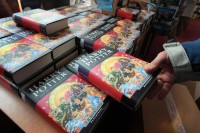
Fall in Love with Criticism
By G. Miki Hayden
Instructor at Writer's Digest University online and private writing coach
firstwriter.com – Wednesday June 26, 2019

Let’s raise our glasses to our true friends who can tell us that our participles are dangling and that our story is too soft. And let’s try to be the type of writers who are brave enough to accept and utilize criticism!–Nancy French

4 Must-Read Dark Fiction Magazines
bookriot.com – Thursday June 20, 2019

Literary magazines need love too. Which is why we like to celebrate them here on Book Riot! We’ve had a Literary Magazines 101 to get you started, discussed general short fiction magazines, science fiction/fantasy magazines, and we’ve even had a how-to post on reading (and writing for) science fiction magazines in particular. But today I want to give a little love to my current obsession: dark fiction. Though you can find dark fiction stories in a lot of different literary magazines, including most of the SFF magazines above, this post is a tribute to those literary magazines that specialize in the macabre, whether it’s horror, dark fantasy, or positively grim science fiction.

In dropping Linda Fairstein, the book industry reveals its cowardice
nypost.com – Sunday June 16, 2019

When Galileo Galilei finished writing his last work, “Two New Sciences,” he had trouble finding a publisher.
Galileo had been branded a heretic, and his work was prohibited by the Inquisition. A patron arranged for the book to be published in Venice and then chickened out. The House of Elzevir (whose name lives on in the modern publisher Elsevier) arranged for the manuscript to be smuggled out of Italy and published in the Netherlands, then as now a stronghold of free thinking.
That defiance could very well have brought a death sentence. But a few publishers once had the grit to stand up to the Inquisition.
In our time, most of them cannot even stand up to Twitter, a measly and miserable inquisition of another kind.

Short-story writers are infinitely more creative than novelists
irishtimes.com – Saturday June 15, 2019

“I deeply detest short-story collections – grotty binbags stuffed with the aborted novels of writers too lazy to bring their progeny to full term.” That was Frankie Gaffney’s intro to his review of June Caldwell’s Room Little Darker, which he went on to praise, but I can’t help thinking some novelists should put an end to their flabby oeuvres. Modern novelists remind me of disreputable farmers injecting their cows with growth hormones to earn a few extra euros. By Frankie’s assessment, if I had been assiduous enough to gestate my short stories, I’d have 41 novels by now, which would be some going.

Why Does Writing Suck?
thecut.com – Tuesday June 11, 2019

It is rare, in this day and age, to see a good tweet on the internet, but I did love this one, from New York Times writer Erin Griffith, which includes a graph she designed to depict the dramatic ups and downs of a writer’s self-esteem, which are entirely dependent upon the stage of the writing/editing process they’re in. There is the ecstatic high in submitting a draft to one’s editor, and the inevitable gloom that follows the first round of edits received. Writing may not be the only profession subject to such wildly variable morale, but to hear writers tell it, there’s simply nothing worse. As Dorothy Parker once said (according to the internet, anyway), “I hate writing, but I love having written.”

So you want to be a novelist? A New York literary agent, editor and author reveal how bestsellers are born
independent.co.uk – Sunday June 2, 2019

Stephen Barbara’s office is nothing to be afraid of. It’s a small, cosy space in Midtown Manhattan with a bookshelf in the corner and inspirational messages on the walls (“There is nothing new in art except talent” and “A mind needs books as a sword needs a whetstone if it is to keep its edge”). Barbara himself is a welcoming person. Though he does claim to be “very argumentative”, that side of his personality doesn’t manifest itself during our hour-long chat. He’s polite, voluble, and answers questions with the patience and precision of someone who loves the topic at hand. Yet most strangers who attempt to contact Barbara will agonise over their emails for weeks. They will ask their friends to proof-read their messages. They will hold their breath as they hit send. They will spend the next hours, days or weeks anxiously refreshing their email inbox. In other words, they will manage their communications with a level of anguish that seems irreconcilable with the perfectly pleasant person sitting in front of me. Stephen Barbara, you see, is a New York literary agent.

Is Small Press for You?
By G. Miki Hayden
Instructor at Writer's Digest University online and private writing coach
firstwriter.com – Sunday June 2, 2019

Manuscript finished, hat in hand, we all yearn to sell to Random House. But while the big guys demand “breakthrough” potential, most of us write mid-list or niche. Therefore, though aiming straight for the top, we might want to keep in mind independent imprints.

Faber & Faber: The Untold Story – What do publishers actually do all day?
irishtimes.com – Saturday May 25, 2019

On my first visit to the offices of Penguin Books in 1990 I remember overhearing the receptionist busily answering phone calls with the greetings, “Hello Penguin”, “Hello Bodley Head”, “Hello Viking”, “Hello Michael Joseph”, “Hello Hamish Hamilton”.
It was a roll call of publishing houses swallowed up by a conglomerate that was later swallowed by another conglomerate. This is no criticism of Penguin who adapted to economic circumstances to continue to publish excellent books. Publishers have survived through amalgamations for decades, resulting in a diminishing pool of gatekeepers for new authors to get past.

Your Complete Guide to Popular Literary Devices in Great Writing
bookriot.com – Thursday May 16, 2019

We all know what it means to read “good writing,” right? Well, no, we don’t. It’s true that we often recognize something as “great” when we see it. Our teachers may reference the “literary devices” that make it good. But if you have to talk about a book in a class, it can be hard to describe “greatness.” This is even more nerve-wracking on a test or quiz. I can’t just write “I liked it” and move on!
WHAT ARE LITERARY DEVICES?
One of the best ways to connect deeply with texts when you are just learning about how to define good writing is through literary devices. Literary devices are like strategies or techniques that a writer can use. They showcase creative thought and connections between things that might otherwise not be connected. When we notice a great connection being made, we get the opportunity to share it with others in our classes or among our friends who also are reading such a book.
Below are just a few of the literary devices you may encounter as you delve into the great works of literature. You might also notice variations of them in your reading for pleasure, and thinking about literary devices may allow you to marvel even more at the genius of your favorite authors.

Jeffery Deaver interview: The secrets of writing a bestseller
cambridgeindependent.co.uk – Wednesday May 15, 2019

Thriller writer Jeffery Deaver was penning award nominated novels - but for some reason they weren’t selling.
After his sixth book - a mystery in the Poirot vein - came out to critical acclaim, but little money, he knew he had to act.
“They were well received, but they didn't do extremely well in terms of sales. Then I re-read them and I realized they weren’t as good as I had hoped,” says Jeffery.
That’s when he began working on something he calls his ‘mint toothpaste’ business plan.
“I’m a big list maker and I was aware that I needed to be more scientific about it. So it was in my late 30s I outlined a book for the first time - after writing half a dozen. That book was exponentially better and so I have been following that model ever since.”
Get the free newsletter | Submit a news item or article | Get Writers' News for your website





